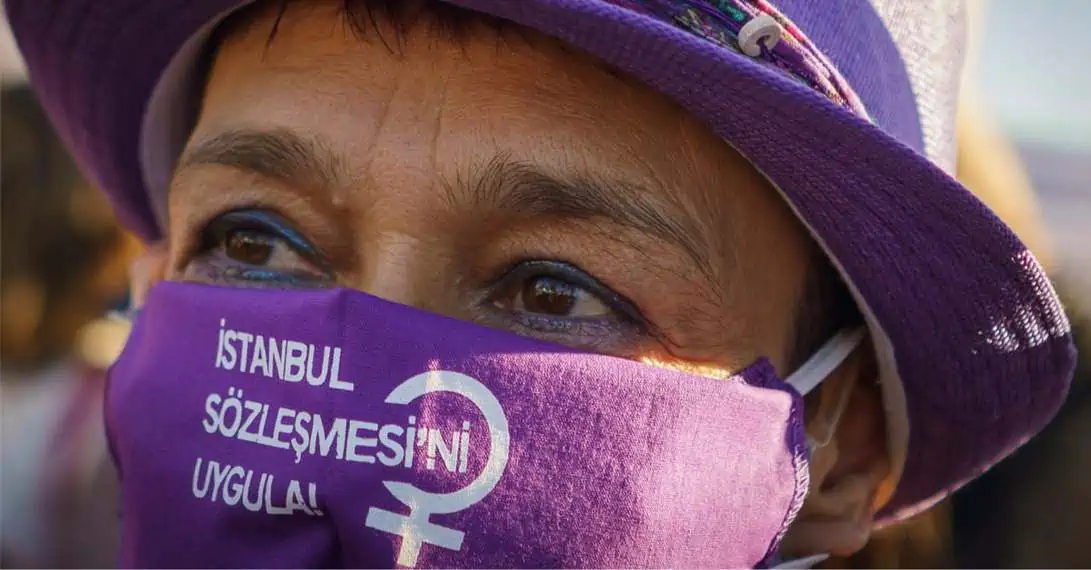The Turkish president no doubt thinks his decision to de-ratify the Istanbul convention is irreversible. The main opposition party disagrees.

In the dark hours of March 20th, a presidential decision was issued in Turkey, through which the president, Recep Tayyip Erdoğan, unilaterally withdrew the state from the Council of Europe Convention on Preventing and Combating Violence against Women and Domestic Violence, the Istanbul convention. This decree deprives women and girls in Turkey of the gold standard of safety and at the same time sends a recklessly dangerous message to perpetrators who abuse, maim and kill: they can carry on, with impunity.
Turkey was the first Council of Europe member state to sign the Istanbul convention in 2011—the city was hosting a meeting of the Committee of Ministers that May—supported by a unanimous vote in the Grand National Assembly. This strong consensus across all political parties, reflecting the popular will, was cast aside by Erdoğan’s act of fiat. The lack of any parliamentary deliberation was very much in the spirit of the regime change of 2018—when Erdoğan introduced an executive presidency—which has accelerated the erosion of the rule of law and democracy in the country.
Still, the Istanbul convention has powerful roots in the centuries-long political and social struggle of women for their rights. It was hard-won—not granted by the grace or favour of any political power or individual. Today in Turkey millions of women persevere with these ideals and are not giving up. Indeed, they had been demanding more effective enforcement of the convention—not its annulment.
That demand has now become that Turkey recommit to the Istanbul convention. Tens of thousands of women, from all walks of life, have joined protests against the withdrawal with a united voice: ‘We are not afraid, we will not be silenced, we will not obey.’
True meaning
The Republican People’s Party (CHP), of which I am secretary general, has been actively taking part in this decisive struggle. As the main opposition, we have upped our efforts in sharing with the public the true meaning of the convention.
We have been campaigning to overcome the misinformation disseminated by misogynist groups and the populist politicians who surrender to them. In the ‘post-truth’ era, insisting on truth is the first critical step of any campaign.
Contrary to these misinformation efforts, the convention does not contain a definition of ‘family’ at all, it does not set new standards and nor does it impose any gender identity or sexual orientation. It legally ensures that sexual orientation and gender identity can not be used as grounds to justify violence. It abjures violence and it supports life, period. We insist on this truth being heard.
Campaigning for truth must be rounded out with a holistic political programme and allied to efforts to convert words into deeds where we can. The CHP has pledged to re-ratify the convention, once and for all, in the first week of a government it would lead. Until that day, we embrace all women subject to violence and try to be their voice.
We have established a 24/7 call centre in our party headquarters. Legal assistance and psychological support, in co-operation with the bar associations and medical associations respectively, are provided to women who reach out to us. We follow their cases in court, not only standing by their side but also making sure truth is spoken publicly and awareness raised.
Filling the void
We also fill the void of public responsibility in municipalities our party governs. At every wedding ceremony they perform, our mayors present to the couple not only their marriage certificate but also a copy of the convention. In those municipalities, the gender imbalance in public occupations is challenged through employment policies that deliberately increase the presence of female bus drivers, engineers, firefighters and others in critical public services.
Local-authority public-investment plans are revamped within a gender-equality perspective, including increased investment in women’s refuges as well as social care across the country. Public, universal and affordable social care—including but not limited to child- and eldercare—is critical in overcoming the barriers to female labour-force participation.
Social-policy programmes that guarantee a basic income to all are also critical in empowering women economically—especially crucial for victims of violence. We intend, when we take office, to initiate a ‘family support insurance programme’, which would guarantee a basic income and overcome precarity by inclusion in the social-security system.
Finally, women’s equal participation and leadership in political life and decision-making is fundamental in achieving gender equality. As such our party’s MPs, led by its chair, proposed a bill in the Grand National Assembly in March, which would ensure gender-equal representation in the assembly and local governments, by means of a 50 per cent quota and ‘zipper’ (candidate alternation) system. We commit to enacting this bill in government.
Our goal is to establish a free and equal future for all, where women’s rights are strongly protected. The Istanbul convention saves lives. So until it is once more binding de jure in Turkey, we shall continue to make it a de facto reality.
Selin Sayek-Böke is secretary general of the Republican People’s Party (CHP) and a member of the Parliamentary Assembly of Council of Europe. She previously held assistant, visiting and associate professor roles respectively in economics at the universities of Bentley, Georgetown and Bilkent and worked for the International Monetary Fund and with the World Bank.

